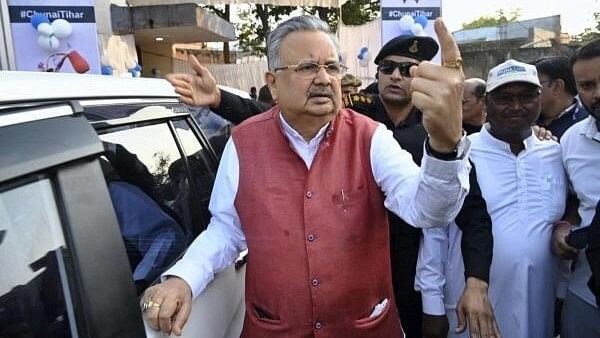
Former Chhattisgarh CM and BJP leader Raman Singh
Credit: PTI File Photo
Raipur: Raman Singh, the Ayurvedic doctor-turned-politician, has earned the reputation of being an able administrator during his 15-year-long stint as the chief minister of Chhattisgarh from 2003 to 2018.
Singh earned the moniker 'Chaur Wale Baba’ (Chaur means rice in the local language) due to the effective implementation of schemes like the Mukhyamantri Khadyann Sahayta Yojana, under which rice, salt and grams are given at subsidised rates to poor families, through the public distribution system (PDS) during his tenure as CM.
The 71-year-old senior BJP MLA was on Tuesday unanimously elected as the speaker of the Chhattisgarh legislative assembly.
Though the Bharatiya Janata Party (BJP) suffered a massive defeat at the hands of the Congress in the 2018 state assembly polls fought under his leadership, Raman Singh remained one of the most prominent leaders of the party in the state.
The BJP's defeat in 2018 was attributed to alleged corruption, lack of coordination between the party organisation and the government and a large chunk of the OBC votes going to the Congress.
Even some senior BJP leaders had expressed displeasure about Raman Singh’s style of functioning and perceived over-reliance on bureaucrats. But his reputation as a development-focused leader remained intact.
Raman Singh was born on October 15, 1952, in a Rajput family in Kawardha town of the erstwhile Madhya Pradesh to Vighnaharan Singh Thakur, a prominent lawyer, and Sudha Singh, a homemaker.
He took the Bachelor of Ayurvedic Medicine and Surgery (BAMS) degree from the Government Ayurveda College, Raipur, in 1975.
His political career started in 1983-84 when he was elected as a councillor of the Kawardha municipal body.
He was elected to the Madhya Pradesh assembly for the first time in 1990 from Kawardha and again in 1993, but lost to Congress's Yogeshwar Raj Singh from the seat in the 1998 state elections.
He defeated Congress veteran Motilal Vora from the Rajnandgaon Lok Sabha seat in 1999, and became minister of state for commerce and industry in the Atal Bihari Vajpayee government at the Centre.
In 2003, when assembly elections were to be held in Chhattisgarh for the first time after its formation, Singh was made president of the BJP's state unit.
The BJP defeated the Ajit Jogi-led Congress and Singh became the chief minister.
His unpretentiousness and clean image coupled with the ability to implement welfare schemes helped him retain power in the state for three consecutive terms.
But he also faced criticism over the alleged civil supply scam and chit fund scandal.
In 2022, the BJP removed Vishnu Deo Sai as its state unit chief and Dharamlal Kaushik as leader of opposition in the assembly.
As both the leaders were close to Singh, it seemed like the party leadership wanted to curtail Singh’s power.
But the perception changed after Singh played an important role in the 2023 polls and the top BJP leaders often praised his governance record during the campaign.
Singh also played a key organisational role as he served as the BJP's national vice president.